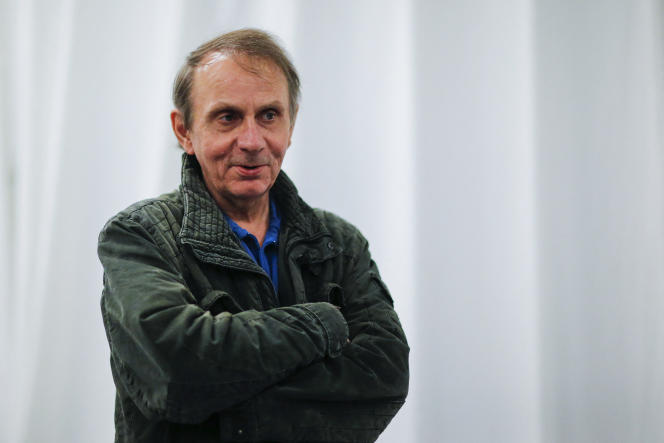On the wrinkled bed sheets, there is a pack of cigarettes, a lighter, an ashtray overflowing with cigarette butts, a remote control, a pair of glasses, a pair of pajamas rolled into a ball, and also, Michel Houellebecq wearing a denim outfit that has seen better days. Knees slightly bent, the world star of contemporary French literature takes a drag on his cigarette and suddenly interrupts what he was saying to note, without much articulation: « I’m lying down. You’re sitting. It’s a bit weird, anyway. I feel like I’m undergoing psychoanalysis, here. »
It is, indeed, all the more disturbing that, from the beginning of our meeting in the Parisian studio where the writer has written « Anéantir » (« Annihilate »), a new novel as thick (730 pages) as exhilarating, he tells me about his dreams. His book, a political thriller that turns into a metaphysical meditation, is full of them. Page after page, we are propelled into the dreamlike adventures of the main character, Paul Raison, 47 years old, a senior civil servant at the Ministry of Economy and Finance, who will gradually emerge from his existential void and reconnect with his father, by facing death.
Dreams were already in his previous books, « Les Particules élémentaires » or « Sérotonine. » This time, Houellebecq uses them in a systematic way: « I’m not too interested in Freud, I have a lot of complaints about him, » he says, « but I’m interested in dreams, and I’m very happy to have put so many of them in ’Anéantir.’ The dream is the origin of all fictional activity. That’s why I’ve always thought that everyone is a creator because everyone reconstructs fiction from real and unreal elements. It’s an important point: I write when I wake up. I’m still a little bit in the night. I still have something of the dream. I have to write before I take a shower. Usually, as soon as you’ve washed, it’s over. You’re no good for anything. »
A sincere and ingenuous laughter
Thus, it is in this smoky den, on this bed, that Houellebecq dreamed « Anéantir. » He had only one step to take to get to the desk where he wrote his novel and where I listened to him for five hours before continuing in the restaurant. On the wall of this studio located in the Asian district of the 13th arrondissement and furnished in a desperately functional way, you can still contemplate the photos that accompanied him while he wrote his novel.
You can see among others: Bruno Le Maire in his ministry, where Houellebecq walked at length – its labyrinthine corridors provide material for one of Paul Raison’s dreams; the church of Notre-Dame-de-la-Nativité near Bercy, where the same Paul finds confirmation that he is decidedly ungifted for hope; Carrie-Anne Moss, the actress who played Trinity in « The Matrix, » who looks just like Paul’s wife, Prudence, one of the novel’s most admirable characters; a hospital room designed for patients in a « chronic vegetative state » (CVS), where we discover Paul’s father, Edouard Raison, a former secret service agent silenced by a stroke, at the very moment when the world is destabilized by a series of enigmatic attacks; or the landscapes of the Beaujolais region, with its green hills and scarlet vines, which will soon be the setting for Paul’s poignant reunion with his father.
I am just observing this image of vines when Houellebecq jumps up to get a corkscrew: « In my opinion, white wine is best. I’m a bit of an alcoholic. Would you like something to drink? » he whispers with a sincere and ingenuous laugh. He looks like a baby waving his rattle.
Let’s take advantage of this to tackle head-on the key question, the one I’ve been dying to ask, that of the children born or who might have been born, as they appear at the turn of a beautiful page that struck me, page 169. At this point of the story, Paul finds himself alone for the first time, in the hospital, with his mute father. After telling him about Prudence, with whom relations are at a standstill, and about Bruno, his minister friend, who is likely to run for the next presidential election (we are in 2027) and whose beheading is staged by mysterious terrorists, Paul makes an unexpected confession: « He added that he regretted not having children, and it was a real shock when he heard these words coming out of his mouth. »
Already, in « Sérotonine, » Houellebecq’s writing showed the possibility of authentic love, despite the darkness of the world. With « Anéantir, » as these lines testify, he goes ahead and installs the childish happiness, proven or even missed, as a way to brave the death that comes. Like Paul, the writer allows himself to be overwhelmed by words that are stronger than him: « You know, when we are correcting the proofs of a novel, we can delete anything we want, » he confides. « There are things that you didn’t write in a premeditated way but you decide to keep anyway. This passage is one of them. I could have removed it, out of modesty, but no. »
Houellebecq has therefore decided to keep this child who appears on page 169. Just as he kept the baby of Prudence’s sister. Prudence throws herself on it with « greed, » cradles and strolls it on the first day they meet: « When Prudence does that, » Houellebecq points out, « it’s not me who tells her to do it, it’s her, it’s the internal logic of the character. These two passages that struck you, I didn’t think of them. They imposed themselves. At some point, if you want to take what I write seriously, you have to believe in this irrational assumption that the characters act on their own. »
Literature as a dream kept alive
Yes, let’s believe in this assumption, all the more willingly because it casts a gentle light on Houellebecq’s conception of literature as a dream kept alive and as an unfolded childhood. When « Anéantir » evokes « this unreal and brutal happiness of childhood, » perhaps he celebrates this dreamy sensibility that makes the child a born poet. « Poetry is a state of preserved childhood, » said Goethe. « The child is an elementary poet, » added Jean Cohen, a language theorist whom Houellebecq cherishes and whom he asked me to read before coming to the meeting.
« When I was a child, I hardly walked at all, » the writer recalls through a curtain of smoke. « To get from one place to another, I would run. And then, at some point, I stopped running. When I run today, but I hardly ever run anymore, I become a child again. When I write poetry, I am less sure. However, my childhood reminds me of a lack of distinction between reality and imagination. To a certain extent, it persists. The first book that marked me was Andersen’s fairy tales. I believed in them. For me, the Little Mermaid was a real person, and even today, I am not far from thinking that the Little Mermaid is real. In the same way, I can tell you right now, without lying, that I miss Prudence. But, as we get older, it’s harder to get out of the waking state. The world is more sticky. When I was young, people used to take drugs a lot. I think they still do a lot of them. One seeks to escape the awareness of the situation because an entirely clear mind is incompatible with life. »
Poetry is a child’s game, the impulse of dreamers who stand upright. In mid-November 2021, during a sound and light show hosted by the Rex Club in Paris, Michel Houellebecq embodied this conviction by reading his poems with three young actors. The atmosphere was nebulous, there was electronic music (by Traumer), and the public was happy. It slipped from one text to another. It was both very professional and enthusiastic. One was under the impression that to regain strength, Houellebecq, like Paul, had to reconnect with his younger years.
In the past, indeed, it all started like that, with public readings of poems. « At the time, I could already see people vibrating, » recalls the author of « Anéantir. » « In the beginning, I did it to please the girls. That’s all. It was a question of showing that I was someone interesting, which was not obvious at first sight. So, don’t exaggerate with the childhood, the childhood spirit, all that. Basically, I’m a whore, I write to get applause. Not for money, but to be loved, admired. After that, don’t take the word ’whore’ negatively. We are happy to please, at the same time. »
Keeping mediocre and bad people at a distance
Saying these words, Houellebecq takes on an air of bravado. He is quite proud of himself. But we don’t believe it. Reading his poems as well as his new novel, measuring the necessity and the power that command his pen, one feels that, success or not, he would have held fast to his desire.
One feels, above all, that his writing seeks more than ever to fuel, if not hope, at least values. We perceive him there, close by, available, thoughtful, in full possession of his strength, happy to propose a morality that allows us to live in the world, to endure life, to keep mediocre and bad people at a distance. In « Anéantir », there are remarkably few of them, only one, in the person of Indy, a journalist without faith or law (obviously), whose portrait is laughable.
Houellebecq’s characters aren’t giving in to the forces of evil but into the temptation of good. And the most poignant pages of his novel are those in which he manages to bring to life, amid solitude and dereliction, fleeting gestures that make you cry. « Contrary to what a famous formula claims, » says the author of « Anéantir, » « I think that it is with good feelings that we make good literature. Throughout the twentieth century, literature was confronted with a fascination for transgression, evil. Hence the complacency towards authors who collaborated with the Nazis like Morand, Drieu, Chardonne, whom I find mediocre. There is no need to celebrate evil to be a good writer! In my books, as in Andersen’s tales, one understands immediately who the bad guys are and who the good guys are. And if there are very few bad guys in ’Anéantir,’ I’m very happy about that. The ultimate achievement would be if there were no bad guys at all! »
« Anéantir, » by Michel Houellebecq, Flammarion, 730 p., €26, digital €18 (in bookstores January 7).
L’article Michel Houellebecq : “It is with good feelings that we make good literature” est apparu en premier sur zimo news.





